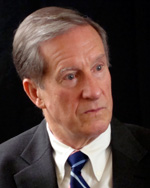
Richard Meeker
Publisher & Co-Owner, Willamette Week
Portland, OR
[OR-E 0101]
I’ll give you a large example that probably really did influence me, although it’s probably almost trite. And then a smaller example that is more realistic about what we really do.
As I told you I grew up in Washington, D.C., I read The Washington Post and The New York Times at the breakfast table from as early as I think I could read. And through my friend Bill Graham [I] was close to the Washington Post Company, and there were the Pentagon papers and Watergate.
I actually even got to sit in on court hearings and do other kinds of things and visit the Graham household during these times. And got to watch how, especially Mrs. Graham, played with these huge issues. And I think something about seeing ordinary humans – Kay Graham was a pretty significant person – but seeing human beings dealing with these earthshaking issues in calm, coherent fashion and actually having fun while they were at it. And I watched Mrs. Graham and Nicholas von Hoffman have an argument about a column he wrote about Watergate and other kinds of things. And the huge risks that they were taking struck me – [that] was what journalism was about and didn’t strike me as risks. You know the Deep Throat business, and all that struck me as legitimate journalism and not as risky. And all this stuff about Kay Graham is gonna’ find “her tit in a wringer” – I never feared for her.
So in those two journalistic activities that involved competing newspapers – The Times and The Post – racing against each other, all kinds of other competing values, sort of highlighted or up-lit the way the world works, and how things are nowhere near so simple as you might think them, and showed journalism changing the course of the world.
Now, that’s the big example – I had nothing to do with it – I was just a spectator.
Once upon a time, there was a battle in this town about guidelines for upgrading class-B buildings. The building owners did not want to install bike racks or leave any space for bicycles. And Willamette Week wrote an article about this big (indicates about two inches) about recalcitrant building owners.
The day that issue came out – the issue of the paper came out – the issue of the bike racks went away. There are bike racks in every class-B building in town, and that’s not why we are such a bicycle-friendly community today, but without things like that, early on, it would be harder to be a bicycle-friendly community.
And that was one little article in our paper – period, the end – changed the debate. And we didn’t even think it would.


